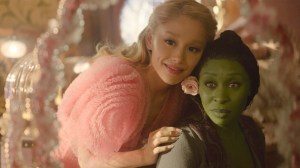As Jon M. Chu brings the latest big-screen installment to L. Frank Baum‘s ever-expanding universe, he’s reflecting on the societal shifts that have historically punctuated adaptations of Oz.
The Wicked director explained that the Yellow Brick Road has become “the road we travel” ever since Baum released The Wonderful Wizard of Oz in 1900, which was later adapted into the Victor Fleming-helmed onscreen masterpiece The Wizard of Oz (1939), starring Judy Garland.
“The Wizard of Oz was always sort of prophetic in a way. It was written at a time of America in transition,” Chu told NBC News. “At that point, the Depression had just finished and they’re about to go into war. And so it’s always a question of about what the American dream looks like when the road ends and what are the possibilities of the next thing.”
The country went through another transition in 2003, when the Tony-winning musical Wicked debuted on Broadway, based on Gregory Maguire’s 1995 book, set in Baum’s world.
“When Wicked came around, it was a re-examination of that,” said Chu. “That was right after 9/11 and about to go into war. So another time where America is in transition.”

Ariana Grande and Cynthia Erivo in Wicked.
Universal Pictures/Everett Collection
Premiering Nov. 22 in theaters, in the wake of Donald Trump‘s presidential re-election, Chu’s adaptation comes at another crucial time for the United States.
“This is the road we travel,” he explained. “And there’s no yellow brick road and then maybe no wizard. Being uncomfortable, maybe yelling at each other a little bit, forgiving each other, having some grace for each other is the only way out.”
Chu said of the movie musical’s timing, “When this came to my desk, it was during the pandemic and I felt like, wow, this thing is so prophetic. How does it know that we would be going through this? We were questioning all the stories of America, of the world. Who’s in control? Who’s telling it? What does a hero look like? What does a villain look like?”






